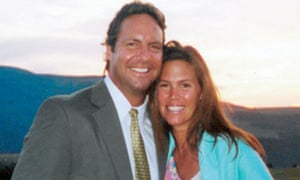Laura Munson: How I kept my husband Amanda Mitchison When Laura Munson's husband told her that he didn't love her any more and wanted out, she simply decided she wouldn't let him go. She talks to Amanda Mitchison Fri 7 May 2010 19.10 EDTFirst published on Fri 7 May 2010 19.10 EDT One fine June day, in the mountains of …
Laura Munson: How I kept my husband

One fine June day, in the mountains of Montana, Laura Munson’s husband said to her, “I don’t love you any more. I’m not sure I ever did. I’m moving out. The kids will understand. They’ll want me to be happy.”
What is the normal reaction to this kind of announcement? You can sob and wail and get down on your knees and beg. Alternatively, you can pick up the meat cleaver and, when the car skids off down the driveway, cut the crotch out of all his suits. But Munson did none of these things. She wasn’t going to let him get away with this. She said, “I don’t buy it.”

He apparently looked most surprised. Then he probably narrowed his eyes – for the next thing he said was, “I don’t like what you’ve become.”
At this point, Munson says, “a shroud of calm enveloped me”. She thought, “It’s just words.” Sticks and stones. Again she said, “I don’t buy it.”
Then she added, “It’s not age-appropriate to expect children to be concerned with their parents’ happiness… There are times in every relationship when the parties involved need a break. What can we do to give you the distance you need, without hurting the family?”
He said, “Huh?”
She said, “Go trekking in Nepal. Build a yurt in the back meadow. Turn the garage studio into a man-cave. Get that drum set you’ve always wanted. Anything but hurting the children and me with a reckless move like the one you’re talking about.”
Then she said again, “How can we have a responsible distance?”
He said, “I don’t want distance. I want to move out.”

She Googled “responsible separation” on the computer, and printed off a list of FAQs about the sharing of keys, credit card access, pets, etcetera.
Appalled, he snarled, “I see what you’re doing. You’re going to make me go into therapy!”
She said, “I just asked: what can we do to give you the distance you need?”
Do you want to know what happened next? Are you gripped? America certainly is. Munson’s book, This Is Not The Story You Think It Is… A Season Of Unlikely Happiness, is now a publishing phenomenon in the US. She has been interviewed by ABC News on Good Morning America and you can see her on YouTube: a picture of all-American wholesomeness – pretty, round face, perfectly aligned teeth, long, glossy brown hair. She claims to be handy with a chainsaw and is used to hauling 1,500lb horses into trailers. You don’t doubt it.
When we talk, it’s 9am in Montana and Munson is sitting with a cup of tea and a view of pines and firs and mountains in the distance. She has got the kids off to school and needs the rest: she is just back from a three-week book tour. The offers are pouring in – China and Taiwan have bought the rights, the German contract is being negotiated.
Things haven’t always been so professionally rosy. Before this book, Munson wrote 14 novels that have never been published. Lesser mortals would have given up, but Munson just developed armadillo hide for skin. “Yeah,” she says. “As a writer, you spill out your guts and care so much about it and you send it off and you get back [the letter saying], ‘This does not meet our needs at this time.’ So when your husband says, ‘You do not meet my needs at this time’, you say, ‘OK, those are just words. I know how to deal with that.'”
“It’s not like I handcuffed him to a chair,” Munson says. “I just didn’t take it personally. People in crisis say all sorts of things.”
Surely it must have been incredibly annoying, having someone staying completely calm and saying, “Do you need a bit of distance?”
Munson replies, “Well, then he can’t play victim. He has to be responsible for his own wellbeing. When you don’t engage in the drama, it bounces back to the person who flung it in the first place.”
In her writing, Munson uses the analogy of a child having a tantrum. The child shouts that they hate you. Do you join in? Do you answer back? Of course you don’t. It’s their problem, not yours. You ignore the tantrum and walk away, even if the toddler’s teeth are still clamped around your arm.
She says carefully, “I’m not saying my husband was being a child.” His spiritual malaise was profound – a personal crisis triggered by the failure of his business – and he wasn’t merely throwing a tantrum. Of course, nobody would dream of saying thwarted middle-aged men behave like toddlers – perish the thought – but when a toddler is out of sorts, you give them “time out”. And that is precisely what Munson offered her husband.
So that summer, instead of moving out – the credit card list seemed to have frightened him – Munson’s husband did what he was told and took “time out”. Effectively he went awol. He came home late, if at all. He wouldn’t call. When he was at home, he was distant, making zero eye contact except for occasional, discombobulating moments when he desired intimacy. He forgot her birthday and went to someone else’s 4th of July party. And he went walkabout. Like an old bear, he retreated into the forest. “He spent a lot of time at a friend’s fishing lodge. He’d take three or four days away.”
And what did she do?
“We live in such a beautiful part of the world and it was summertime, so the kids were out of school [Munson’s daughter was then 12 and her son eight] and there was a lot of being with them in nature. There was more writing, more getting on my horse. I did grounded stuff: cooking, gardening. I was incredibly calm. That was a summer of unlikely happiness. I don’t mean ‘blissed-out’ happiness, but sometimes happiness is just one little step outside of suffering. For me, that summer was a very calm, grounded time full of deep breathing.”
But here there is a little pause, and she adds: “And inner tantrums. Believe me. When I was out alone in the woods, I was screaming at trees and crying and galloping my horse as fast as I could and diving into freezing mountain lakes.
“Of course you think, ‘Is there another woman?’, ‘What sort of role model am I being?’, ‘How much longer can I put up with this?’ This is a man I love and is a great father… and suddenly he is being a completely different person. We all have these destructive thoughts in our head. In the book I name them ‘my evil twin sister Sheila’. I have no idea where I came up with that – probably a soap opera from the 80s.” Yet in front of her husband and children, Munson remained composed.
Indeed, it is her unusual composure in the face of marital crisis that seems to have caught the public imagination, provoking a flurry of debate. Some see her as a Gandhi-like figure, others as a doormat, still others as “passive aggressive”. Time ran a story on How To Save Your Marriage By Not Doing Anything, while the Newsweek headline read When Divorce Isn’t The Only Choice. Munson is being held up as a role model for a radical new relationship dynamic, but can anyone else learn from her experience? Marriage gurus point out that there are different kinds of relationship breakdown – long, corrosive ones – that might be beyond repair, and sudden crises that could benefit from a Munson-style stonewalling.
For all her slightly new age references and talk of deep breathing and eternal wisdom, Munson is, in fact, advocating rather old-fashioned values: stoicism, loyalty, self-control, reticence, discretion. To her credit, her children remained more or less unaware of what was happening that summer (though they can’t be now). She was also careful in whom she confided: “I didn’t share it with many people. I chose friends who loved my husband and believed in us, not friends who’d say, ‘Kick him out!’ People love a drama, and a drama doesn’t necessarily serve anyone or anything.”
What Munson believes helped her cope and see what was happening to her husband was the fact that, two years earlier, she had undergone her own personal crisis. In a short space of time, her first big publishing deal had folded, her father died suddenly and her dog was shot. “I was miserable. Suffering had become my norm. And that’s when I hired a good therapist.” The therapist helped her revaluate her priorities, learn to embrace the present and not judge herself by worldly success. Armed with this wider perspective – and the 14 novel-thick armadillo skin – she was prepared for anything. In fact, she says, the marital crisis was grist to the mill: “I like to say I had the map and he gave me the territory.” It was, for all the suffering, an oddly exhilarating experience.
Munson had set herself a six-month limit for her husband’s “time out”. But a family tragedy made him start to sort himself out a little sooner. “His sister got cancer and her husband had just left her and she had five children and she actually died last 4 July. Midway through that summer, he went to live with her and help her, and I think it was that experience of seeing somebody he loved so dearly lose their life at such a young age. He began to understand what was really important wasn’t his job. It was his relationships.”
The day he came home from that visit to his sister, “I was in the hot tub, and he came out and got in and he said, ‘I just have to apologise for everything I have put you through this summer, and I can never repay you. I am a 40-year-old trying to be a 20-year-old, and I realise my career is done with and I have to find something else.”
Other encouraging signs followed: he started fixing broken doorknobs, and murmuring about repainting the porch, and getting logs in for the winter. Then came the clincher: “One day I came home and there was a satellite truck in our driveway. I thought, ‘Huh! This guy is getting the satellite upgraded. He might mow the lawn and not come back. But a guy that has ordered more sports channels – he is not going anywhere!”
And he stayed. By Thanksgiving 2008, the crisis was over. Now they are back together and he has found a job. “Of course,” she adds, a little tartly, “at the end it is not all tied up in a perfect pink bow.”
And the moral of it all? Her book is not, she insists, a guide on How To Keep Your Man. On the contrary: “It’s all about letting go. Suddenly, the minute I let go of ever getting published, and of my marital outcome, that is when everything turns round. I find that incredibly interesting.”
• Laura Munson’s This Is Not The Story You Think It Is… A Season Of Unlikely Happiness is published in the US by Amy Einhorn Books/Putnam.
